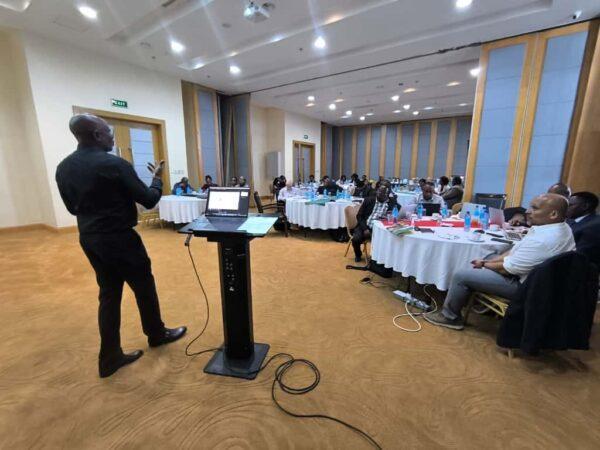Africa-Press – Malawi. Malawi has unveiled an ambitious plan to transform its poultry industry into a key driver of nutrition, job creation, and inclusive economic growth — with government and development partners pledging bold reforms and investments to unlock the sector’s full potential.
The two-day National Poultry Delivery Lab, which opened in Lilongwe on Tuesday, has brought together stakeholders from government, the private sector, and international partners to craft a practical roadmap for poultry sector growth over the next decade.
Organised by the Ministry of Agriculture in collaboration with the Alliance for a Green Revolution in Africa (AGRA) and the Poultry Industry Association of Malawi (PIAM), the initiative marks a major shift from rhetoric to results.
“This is not another workshop where we identify problems and go home,” declared Dr. Julius Chulu, Director of Animal Health and Livestock Development at the Ministry of Agriculture, Irrigation and Water Development. “This is a Delivery Lab — a results-driven process designed to break through bureaucratic inertia and create actionable change.”
Dr. Chulu said Malawi’s poultry sector, long seen as a gateway for agricultural industrialisation, holds vast untapped potential.
“Chicken meat is the most preferred source of protein in Malawi, yet national consumption stands at only 3.16 kilograms per person per year — far below what our population needs for adequate nutrition,” he said.
Despite persistent economic challenges, demand for chicken continues to rise. Malawi’s per capita chicken consumption, he noted, already exceeds Kenya’s, even though Kenya’s GDP per capita is four times higher. “Our people want chicken. They value chicken. And when they can afford it, they buy chicken,” Dr. Chulu emphasised.
A recent value chain analysis shows that with the right policies and investments, Malawi’s poultry production could grow from 83,000 tonnes to nearly 130,000 tonnes by 2030 — a 48,000-tonne increase. This growth could lift nearly half a million Malawians out of poverty through deeper value chain integration with maize, soybean, and feed production.
However, challenges remain daunting. Feed costs — which account for an estimated 77 percent of total production costs — are among the highest globally. High maize and soybean prices, coupled with price volatility, make profitability difficult for many farmers.
“A Malawian consumer must spend 3.51% of their per capita GDP to buy just 10 kilograms of chicken. In South Africa, that figure is 0.24%. This disparity is unacceptable,” Dr. Chulu stressed.
He also pointed to missed export opportunities, noting that Mozambique imports over 30,000 tonnes of poultry annually, mostly from South Africa and South America — yet Malawi, despite its proximity and logistical advantages, has not captured that market.
The Delivery Lab aims to produce five key outcomes: a shared vision for the sector, a detailed reform roadmap, a clear accountability framework, a system for tracking progress, and firm commitments from both government and private stakeholders.
On behalf of the government, Dr. Chulu announced a range of policy measures, including a review of VAT on soybean cake, an assessment of farmgate price controls, and the streamlining of export processes through one-stop shops and public-private partnerships. These efforts, he said, will align with the Second Agricultural Productivity Programme (SAPP II) to promote commercialisation and climate resilience.
“Every kilogram of affordable chicken we produce is nutrition on a child’s plate. Every job we create in the poultry value chain is hope for a family. Every farmer we integrate into commercial value chains is a step toward the prosperous, self-reliant Malawi envisioned in Malawi 2063,” he said.
Representing AGRA, Chipo Kachiwala described the Lab as “a vital step towards unlocking the full potential of the poultry sector in Malawi.”
“At AGRA, we firmly believe that the poultry industry holds immense promise to drive inclusive economic growth, create jobs, and improve nutrition outcomes across the country,” she said. “As one of the fastest-growing agricultural value chains, poultry represents an opportunity not only to enhance household incomes but also to build a resilient and competitive agri-food system that benefits all.”
Kachiwala noted that AGRA’s involvement forms part of the Southern Africa Poultry Initiative (SAPI), which is promoting coordinated reforms across the region. Similar delivery labs have already been held in Tanzania and Mozambique, both of which secured commitments from the World Bank and regional partners to develop national poultry strategies.
“This Lab is a co-creation platform — a space to design solutions, assign responsibilities, and build a delivery mechanism that ensures accountability and results,” she added, noting that the outcomes will directly inform Malawi’s forthcoming National Poultry Strategy.
AGRA, she said, is already partnering with the Farmers Union of Malawi on poultry initiatives and will continue to support investments, capacity building, and stakeholder coordination.
“Together, we are building not just a stronger poultry sector, but a more resilient and inclusive agricultural economy,” Kachiwala said.
The Lab’s outcomes will be presented later this month at the Poultry Futures Forum 2025 in Lusaka, Zambia, where Malawi will showcase its commitments alongside regional peers.
As discussions got underway, one message resonated clearly across the room — Malawi’s poultry sector is ready to spread its wings, provided government, farmers, financiers, and partners pull together to make it soar.
For More News And Analysis About Malawi Follow Africa-Press






